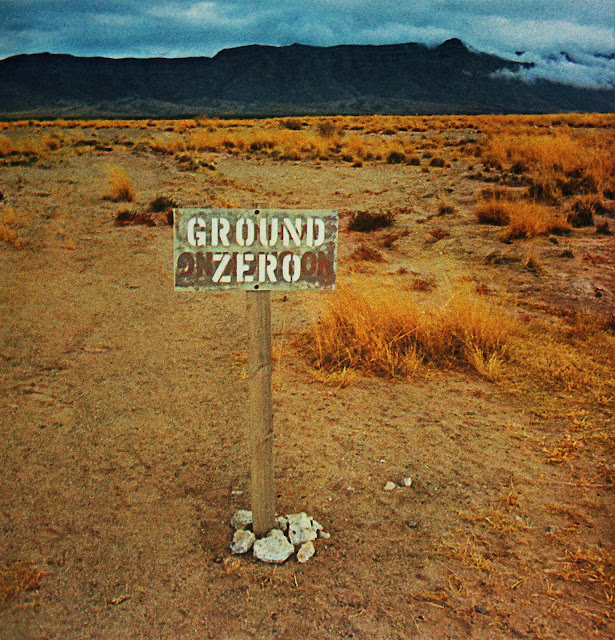 |
| Trevor Paglen, They Watch the Moon, 2010. |
Turnkey Tyranny,
Surveillance and the Terror State
By Trevor Paglen
By exposing NSA
programs like PRISM and Boundless Informant, Edward Snowden has revealed that
we are not moving toward a surveillance state: we live in the heart of one. The
30-year-old whistleblower told The Guardian’s Glenn Greenwald that the NSA’s
data collection created the possibility of a “turnkey tyranny,” whereby a
malevolent future government could create an authoritarian state with the flick
of a switch. The truth is actually worse. Within the context of current
economic, political and environmental trends, the existence of a surveillance
state doesn’t just create a theoretical possibility of tyranny with the turn of
a key—it virtually guarantees it.
For more than a
decade, we’ve seen the rise of what we might call a “Terror State,” of which
the NSA’s surveillance capabilities represent just one part. Its rise occurs at
a historical moment when state agencies and programs designed to enable social
mobility, provide economic security and enhance civic life have been targeted
for significant cuts. The last three decades, in fact, have seen serious and
consistent attacks on social security, food assistance programs, unemployment
benefits and education and health programs. As the social safety net has
shrunk, the prison system has grown. The United States now imprisons its own
citizens at a higher rate than any other country in the world.
While civic parts of
the state have been in retreat, institutions of the Terror State have grown
dramatically. In the name of an amorphous and never-ending “war on terror,” the
Department of Homeland Security was created, while institutions such as the
CIA, FBI and NSA, and darker parts of the military like the Joint Special
Operations Command (JSOC) have expanded considerably in size and political
influence. The world has become a battlefield—a stage for extralegal
renditions, indefinite detentions without trial, drone assassination programs
and cyberwarfare. We have entered an era of secret laws, classified
interpretations of laws and the retroactive “legalization” of classified
programs that were clearly illegal when they began. Funding for the secret
parts of the state comes from a “black budget” hidden from Congress—not to
mention the people—that now tops $100 billion annually. Finally, to ensure that
only government-approved “leaks” appear in the media, the Terror State has
waged an unprecedented war on whistleblowers, leakers and journalists. All of
these state programs and capacities would have been considered aberrant only a
short time ago. Now, they are the norm.
Politicians claim
that the Terror State is necessary to defend democratic institutions from the
threat of terrorism. But there is a deep irony to this rhetoric. Terrorism does
not pose, has never posed and never will pose an existential threat to the
United States. Terrorists will never have the capacity to “take away our
freedom.” Terrorist outfits have no armies with which to invade, and no means
to impose martial law. They do not have their hands on supra-national power
levers like the World Bank and the International Monetary Fund. They cannot
force nations into brutal austerity programs and other forms of economic
subjugation. But while terrorism cannot pose an existential threat to the
United States, the institutions of a Terror State absolutely can. Indeed, their
continued expansion poses a serious threat to principles of democracy and
equality.
At its most
spectacular, terrorism works by instilling so much fear in a society that the
society begins to collapse on itself. The effects of persistent mass
surveillance provide one example of such disintegration. Most obviously,
surveillance represents a searing breach of personal privacy, as became clear
when NSA analysts passed around phone-sex recordings of overseas troops and
their stateside spouses. And while surveillance inhibits the exercise of civil
liberties for all, it inevitably targets racial, religious and political
minorities. Witness the Department of Homeland Security’s surveillance of
Occupy activists, the NYPD’s monitoring of Muslim Americans, the FBI’s ruthless
entrapment of young Muslim men and the use of anti-terror statutes against
environmental activists. Moreover, mass surveillance also has a deep effect on
culture, encouraging conformity to a narrow range of “acceptable” ideas by
frightening people away from non-mainstream thought. If the government keeps a
record of every library book you read, you might be disinclined to check out
The Anarchist Cookbook today; tomorrow you might think twice before borrowing
Lenin’s Imperialism.
Looking past
whatever threats may or may not exist from overseas terrorists, the next few
decades will be decades of crisis. Left unchecked, systemic instability caused
by growing economic inequality and impending environmental disaster will
produce widespread insecurity. On the economic side, we are facing an
increasingly acute crisis of capitalism and a growing disparity between the
“haves” and “have-nots,” both nationally and globally. For several decades, the
vast majority of economic gains have gone to the wealthiest segments of
society, while the middle and working classes have seen incomes stagnate and
decline. Paul Krugman has dubbed this phenomenon the “Great Divergence.”
A few statistics are
telling: between 1992 and 2007, the income of the 400 wealthiest people in the
United States rose by 392 percent. Their tax rate fell by 37 percent. Since
1979, productivity has risen by more than 80 percent, but the median worker’s
wage has only gone up by 10 percent. This is not an accident. The evisceration
of the American middle and working class has everything to do with an all-out
assault on unions; the rewriting of the laws governing bankruptcy, student
loans, credit card debt, predatory lending and financial trading; and the
transfer of public wealth to private hands through deregulation, privatization
and reduced taxes on the wealthy. The Great Divergence is, to put it bluntly,
the effect of a class war waged by the rich against the rest of society, and
there are no signs of it letting up.
All the while, we
are on a collision course with nature. Mega-storms, tornadoes, wildfires,
floods and erratic weather patterns are gradually becoming the rule rather than
the exception. There are no signs of any serious efforts to reduce greenhouse
emissions at levels anywhere near those required to avert the worst
climate-change scenarios. According to the most robust climate models, global
carbon emissions between now and mid-century must be kept below 565 gigatons to
meet the Copenhagen Accord’s target of limiting global warming to a two-degree
Celsius increase. Meanwhile, as Bill McKibben has noted, the world’s energy
companies currently hold in reserve 2,795 gigatons of carbon, which they plan
to release in the coming decades. Clearly, they have bet that world governments
will fail to significantly regulate greenhouse emissions. The plan is to keep
burning fossil fuels, no matter the environmental consequences.
While right-wing
politicians write off climate change as a global conspiracy among scientists,
the Pentagon has identified it as a significant threat to national security.
After a decade of studies and war games involving climate-change scenarios, the
Department of Defense’s 2010 Quadrennial Review (the main public document
outlining American military doctrine) explains that “climate-related changes
are already being observed in every region of the world,” and that they “could
have significant geopolitical impacts around the world, contributing to
poverty, environmental degradation, and the further weakening of fragile
governments. Climate change will contribute to food and water scarcity, will
increase the spread of disease, and may spur or exacerbate mass migration.”
Nationally and internationally, the effects of climate change will be felt
unevenly. Whether it’s rising water levels or skyrocketing prices for foods due
to irregular weather, the effects of a tumultuous climate will
disproportionately impact society’s most precarious populations.
Thus, the effects of
climate change will exacerbate already existing trends toward greater economic
inequality, leading to widespread humanitarian crises and social unrest. The
coming decades will bring Occupy-like protests on ever-larger scales as high
unemployment and economic strife, particularly among youth, becomes a “new
normal.” Moreover, the effects of climate change will produce new populations
of displaced people and refugees. Economic and environmental insecurity
represent the future for vast swaths of the world’s population. One way or
another, governments will be forced to respond.
As future
governments face these intensifying crises, the decline of the state’s civic
capacities virtually guarantees that they will meet any unrest with the authoritarian
levers of the Terror State. It won’t matter whether a “liberal” or
“conservative” government is in place; faced with an immediate crisis, the
state will use whatever means are available to end said crisis. When the most
robust levers available are tools of mass surveillance and coercion, then those
tools will be used. What’s more, laws like the National Defense Authorization
Act, which provides for the indefinite detention of American citizens, indicate
that military and intelligence programs originally crafted for combating
overseas terrorists will be applied domestically.
The larger,
longer-term scandal of Snowden’s revelations is that, together with other
political trends, the NSA’s programs do not merely provide the capacity for
“turnkey tyranny”—they render any other future all but impossible.
Reposted from Guernica, many thanks to Trevor. Trevor
Paglen’s most recent book, The
Last Pictures is a meditation on the intersections of deep-time, politics,
and art. See also Brian Holmes’ essay on Paglen’s art in the scurvy tunes archives. -GR







No comments:
Post a Comment